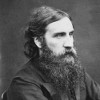“ for no one is involuntarily happy, but wickedness is voluntary. ”
Aristotle, Nicomachean Ethics (c. 334 BC - 330 BC). copy citation
| Author | Aristotle |
|---|---|
| Source | Nicomachean Ethics |
| Topic | wickedness |
| Date | c. 334 BC - 330 BC |
| Language | English |
| Reference | |
| Note | Translated by W. D. Ross |
| Weblink | http://classics.mit.edu/Aristotle/nicomachaen.mb.txt |
Context
“Now if it is in our power to do noble or base acts, and likewise in our power not to do them, and this was what being good or bad meant, then it is in our power to be virtuous or vicious.
The saying that 'no one is voluntarily wicked nor involuntarily happy' seems to be partly false and partly true; for no one is involuntarily happy, but wickedness is voluntary. Or else we shall have to dispute what has just been said, at any rate, and deny that man is a moving principle or begetter of his actions as of children. But if these facts are evident and we cannot refer actions to moving principles other than those in ourselves, the acts whose moving principles are in us must themselves also be in our power and voluntary.”
source



